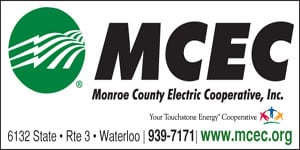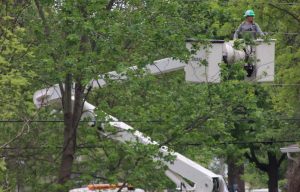Columbia biz district drama
The Columbia City Council chambers were once again packed Monday night for a second public hearing about a proposed business district in the northern part of the city.
After nearly 90 minutes of discussion, the hearing was continued to the March 18 council meeting.
Three business owners who operate within the proposed business district spoke in opposition.
The first was Sanjay Patel, owner of Red Roof Liquor & Lottery at 301 Southport Drive.
“I have a couple of concerns regarding this,” Patel began.
Patel said he did not have a problem with an additional sales tax placed on items inside the convenience store, although he was worried about imposing an additional tax on gasoline.
Patel explained it would cost his business about $40,000 if it had to absorb the additional tax.
“If we raised the price (of gas) four or five cents per gallon, that would make a significant impact on our business,” he said, including reduced foot traffic for the purchase of merchandise other than gas.
When Illinois raised fuel costs by six cents several years ago – prior to COVID-related shutdowns – Patel said he saw a 25,000 gallon per month dip in gas sales and 30 percent of overall business due to the increase.
He also pointed to a potential loss of sales to other gas stations in Columbia or right across the river in Missouri.
“The business district is not going to make that money if I’m not pumping gas or (losing) inside sales,” Patel concluded.
The next speaker was Lisa Braun, owner of R&M Oil at 603 Old Route 3.
Braun reiterated much of what Patel said, but suggested a much more dire outcome for her business.
With her company specializing only in fuel sales, she hypothesized a mandatory increase due to an additional tax could force her to move her business out of Columbia.
“I estimated that my company paid just above $100,000 in sales tax last year,” Braun began. “My business is not like (Patel’s). We don’t do foot traffic. Our stuff is all delivered to the county. Our customers, because they’re bulk delivery people, they call up, they ask for a price. If our price is higher than our competitor, they buy from somebody else. So, being four cents over everybody else – because I’m not going to eat that. That has to be passed on – I would say we’re probably going to have a reduction of 70 or 80 percent of our business.”
Braun explained that would in turn be a reduction in sales tax for the city.
“I hope you all will listen to that a little bit. I don’t know if there’s a way to carve us out, but we do own property in the county. We can move down there. You would not get our $100,000, either. Just something to put in your thoughts,” Braun said. “I love doing business with the city. I have no problem with the city. But just be aware, (the business district) would be detrimental to my business and I’m not going to sacrifice my business for it.”
Next to speak was Tim Wheeler, owner of Top Shooters Sports Bar at 531 Old Route 3 and part-owner of the new Southport Plaza development across from Red Roof Liquor & Lottery, which would also be included in the business district.
While Wheeler said some of the plan looks OK, he did criticize the city for what he described as rushing through the process without considering the businesses already in the proposed district.
Wheeler also alleged that city officials did not meet with many impacted business interests until he requested a meeting.
“What is the district here for?” Wheeler asked several times.
Ward IV Alderman Mary Ellen Niemietz read page two of the business district proposal, which states in part the district is intended to induce development along Route 3 near I-255.
“As I read this, bear in mind that in the back of our minds is the (Dupo/I-255) interchange that’s going to go in,” Niemietz added. “The council… is trying to be proactive, trying to stay ahead of the game.”
Columbia City Administrator Doug Brimm responded to Wheeler’s questioning the inclusion of the Columbia Public Works Department and parcels along Sand Bank Road in the proposed district.
Noting the area is the former site of an Illinois Power building, Brimm said “having a tax-exempt property, frankly, is not in the city’s best interest. That property generates no property tax. It generates no sales tax.”
Brimm also said Columbia has been exploring options to relocate its public works department to an area that is not “prime commercial property.”
After speaking for nearly 30 minutes, Columbia City Attorney Terry Bruckert finally asked Wheeler to give others time to speak.
John Descher of Skyline Drive also addressed the council. He was concerned with what development plans were already in place, as he said he and other residents of Skyline Drive feel like the forgotten part of the city.
Descher also said he felt slighted by the way the Brockland GMC auto dealership managed relationships with neighboring residential properties when it developed a commercial property on Old Route 3.
Mayor Bob Hill explained that there are properties zoned for commercial use, but the city was not in a position to give any information about possible development.
Bruckert added, “Anyone who gets involved in economic development knows you don’t tell everything you know, because that’s the fastest way to run economic development away – by talking about it prematurely.”
Ward II Alderman Lauren Nobbe, who disclosed she is related to Descher, said, “We are just as concerned with the future of this community as anyone… We don’t want to put anyone out of business. It’s the last thing we want to do. We don’t want to run people out of their homes.”
Descher concluded by saying, “We’re not going anywhere, we were just curious.”
After Melvin Stuckmeyer addressed drainage concerns which were voiced during the Feb. 6 public hearing, Brimm recommended Monday’s hearing be continued to March 18. That council meeting begins at 7 p.m. at City Hall.
Prior to public comment, John Brancaglione of PGAV Planners began the public hearing with a description of the changes and a general overview of what a business district entails.
Two parcels on West Sand Bank Road, two parcels on Palmer Creek Road, and a driveway easement were added. The easement was added to make Sand Bank Road properties contiguous with business district boundaries.
Another significant change to the proposal was the elimination of any mention of “eminent domain.”
During the Feb. 6 hearing, a residential property owner expressed great concern that she and her family would be forced to move from their home should the business district be approved.
Although city officials said there were no plans to exercise that power, the term was removed to officially eliminate any confusion.
Brancaglione then fielded questions from aldermen, mostly about what the purpose and benefits of a business district mean for the city.
Brancaglione explained Columbia would benefit from extra taxes collected from businesses in this district.
With those funds, the city would be able to initiate public improvements “that would make a property developable,” such as installation of water and sanitary sewer lines, site grading, other preliminary site improvements and improvement or creation of roadways in the district.
Brancaglione also emphasized any reimbursement for projects which would benefit a single business would need to be generated from the taxes from that business, adding potential developers would need to be able to be finance building costs up front, as it could take several years to generate the needed tax revenue for reimbursement.
During her comments, Braun asked what happens to businesses in the district that do not need improvements or special projects funded by the district taxes.
Brancaglione explained the taxes would go into the primary fund for public improvements.
While unused funds can be used for projects such as infrastructure and transportation improvements to benefit the business district overall, Bruckert said it is “extremely rare” for an individual business to get anything “besides what they are generating on their property.”
Waterloo has a similar business district.
An ordinance establishing the Waterloo Commons Business District began Jan. 22, 2007. When The DESCO Group developed this area between Route 3 and North Market Street that includes Schnucks and other businesses, a 1 percent tax was implemented on sales of tangible personal property other than property titled, sales of food for human consumption which is to be consumed off premises where it is sold (other than alcoholic beverages, soft drinks and food that has been prepared for immediate consumption), and prescriptions and non-prescription medicines, drugs and medical appliances.
The Waterloo Commons Business District was extended by 10 years in 2019 as the initial agreement had come to an end.








